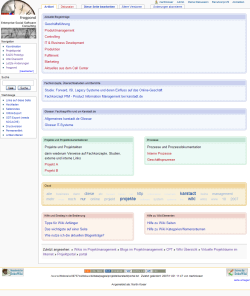Einer der Vorträge auf dem dritten Kongress “Open Source Meets Business”, der mich auch direkt und professionell interessiert ist “Wissensmanagement in verteilt arbeitenden Teams mit TikiWiki” von Oliver Linssen (Liantis GmbH & Co. KG.)
Die Arbeit von IT-Dienstleistern wie Liantis beim Kunden führt dazu, dass Mechanismen des internen Wissenstranfers (Kaffeküche, Mittagessen, Flurgespräche) nicht funktionieren: Die Arbeit in verteilten Teams fordert andere, flexiblere Unterstützungstechnologien.
Gesucht wurde eine Lösung, die Informationen u.a. über Projekte, das Wissen von Mitarbeitern, die Ablauf- und Aufbauorganisation des Unternehmens und andere Inhalte zentral ablegt. Die Inhalte müssen durch jeden Beteiligten mit Berechtigung von jedem Ort aus bearbeitet und versioniert abgespeichert werden können. Das System arbeitet mit strukturierten und unstrukturierten Daten. Verschiedene Ansätze der Einordnung, Klassifikation und Auswertung der strukturierten Daten sollen das Wiederfinden der Inhalte ermöglichen.
Liantis hat auf der Grundlage der Open Source Software TikiWiki ein auf ihre Belange zugeschnittenes Wissensmanagementsystem als Bestandteil einer umfassenden Intranetplattform implementiert. TikiWiki bietet eine Vielzahl an Features, die intelligent genutzt und erweitert wurden. Trotz des großen Funtionsumfangs ist TikiWiki in der Anwendung intuitiv zu erlernen. Dieser Artikel/Vortrag beschreibt die Konzeption des Wissensmanagementsystems und seine Nutzung in einem verteilt arbeitenden IT-Dienstleisters.
Wissensmanagement der Liantis auf der Open Source Meets Business
Anforderungen bei Liantis:
– Browser als Client
– LAMP-Stack
– Open Source
– Community
– Anwenderdoku auf Deutsch
Gewählt wurde TikiWiki, wohl mit einigen Anpassungen bzw. Erweiterungen
– Seitentemplates
– Facettenklassifikation der einzelnen Wiki-Seiten, ähnlich wie Tags
– Rechteverwaltung (horizontal & vertikal), d.h. auf User- und Seitenbasis
– Auswertungen und Berichte (von Liantis selbst implementiert, Ziel war es stets einen Überblick über die intern verfügbaren IT-Kompetenzen zu haben)
– …
Die Erfahrungen von Liantis mit dem Wiki-Einsatz im internen Wissensmanagement sind recht positiv, entsprechend werden die Anwendungen weiter ausgebaut, u.a. wird die Integration mit den bestehenden (Datenbank-)Systemen und dem bestehenden Intranetportal angestrebt.
Die Erfahrungen mit der Wiki-Usability sind großteils positiv, zu den Problemen an denen gearbeitet wird zählt u.a. die Volltextsuche mit logischen Ausdrücken. Der fehlende WYSIWYG-Editor wird als kleines Problem empfunden, nun ja.
Hier sind die Folien zum Vortrag.
 I wonder if I can make it to Boston this year, the Enterprise 2.0 conference sure
I wonder if I can make it to Boston this year, the Enterprise 2.0 conference sure 
 Dann am 30.01 ein Workshop an der Universität Stuttgart: SOA & Co.: Diensteorientierung in der IT, sowie vom 8.-10.02 das
Dann am 30.01 ein Workshop an der Universität Stuttgart: SOA & Co.: Diensteorientierung in der IT, sowie vom 8.-10.02 das  In der Woche darauf wieder eine Konferenz, im Rahmen der
In der Woche darauf wieder eine Konferenz, im Rahmen der  Am Freitag 29.02 startet dann das
Am Freitag 29.02 startet dann das  So I thought it a good idea to compile some information and experiences on using social software in project management (yes, most of this is may be valid also for multiproject- or program management, like in this actual project portal I did, depicted on the left).
So I thought it a good idea to compile some information and experiences on using social software in project management (yes, most of this is may be valid also for multiproject- or program management, like in this actual project portal I did, depicted on the left).